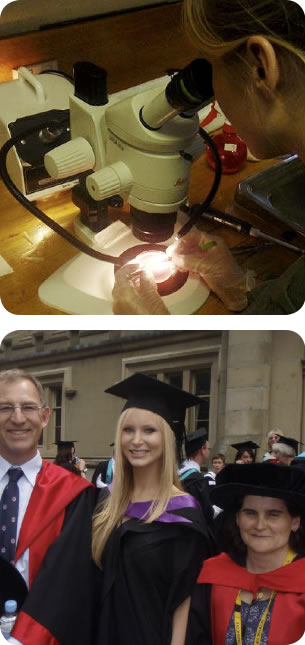
Lila Landowski
Menzies Research Institute
Growing nerves!
Did you know that everything you do – whether you are thinking about doing it or not - is controlled by your brain? When you walk, do you think about squeezing all those different muscles so one leg always ends up in front of the other? Do you think about breathing, or digesting food? Our brain doesn't need us to tell it what to do... it just knows how!
The brain is able to talk to the other parts of the body because of special communicating cells, called neurons. These neurons are like electrical wires that connect your body parts to your brain, so that the brain can tell it what to do. Unfortunately, when people get badly injured, the neurons can get crushed or cut. When this happens, your brain can no longer communicate with whatever it was connected to. For example, when someone has been in a bad car accident, they may become a paraplegic. They have to use a wheelchair because they are no longer able to walk or move their legs. This is because the brain is no longer able to talk to the legs, because the neurons connecting them have been severed. The neurons aren't able to grow back, so the brain can never talk to the legs again. As a result, these people are unable to walk for the rest of their lives.
My research involves looking at some potential treatments that might help the nerves to grow back. This has implications in treating not just injuries, but also neuropathies (like Motor Neuron Disease, or what people can get in diabetes) and neurodegenerative diseases (like Multiple Sclerosis). For the past year and a half I have been investigating these potential therapies, trying to figure out what they are doing, whether they may be good, and how they function. Now I am doing the exciting part - finding out if they work!
What interested you in science as a child?
I was always an inquisitive little kid. I was the tomboy that was forever looking for tadpoles in ponds, hunting for fish, frogs and lizards. When I was really young and I was asked, "What do you want to be when you grow up?" unlike the other kids, who wanted to be nurses, firemen and policemen, I always replied "I want to make cures from fish!" I loved fishing and all marine life, and I'd heard of things derived from sea creatures, like deep sea shark liver oil, and how you could take it to make you healthy. I wanted to find something even more special in fish, that I could use to cure diseases (So I may have been a little naive back then - hindsight is a great virtue!). I wondered why we got sick in so many different ways, and why some people didn't get better. I wanted to find a way to fix it.
What did you study at university?
In order to fulfil this early childhood dream of "making cures (from fish)," without any re-consideration, I enrolled in a degree called a Bachelor of Marine, Freshwater and Antarctic Biology. I quickly discovered that this was the wrong degree. I had convinced myself for so long that I wanted to be a medical researcher in marine biology, that I didn't realise that path I had chosen (at the age of 7) was the wrong way to go about getting into medical research. In that year, a new degree was made – Bachelor of Medical Research – and I discovered the degree was perfectly tailored to a future career in therapeutic research. Make sure you take advantage of University open days, so you can choose the right degree for you before you start. Medical research is the ultimate career that can allow you to work towards treatments and therapies, or to simply work towards better understanding certain diseases, which is just as, if not more, important.
Who/what were important influences for you?
I always remember the Nobel prize awards that were screened on TV, and how the people who won those awards had really done something great for science and/or humanity. My father would say they were very important people, and that they were getting these awards because they had cured a disease or discovered something really interesting. I wanted to be admired for making a contribution to science too, which I guess is where the idea of becoming a medical scientist (and doing a PhD) was first born.
What do you love about science?
I love that I am the first person in the world to lay eyes on the exciting results of each experiment!
Find out more about the Menzies Research Institute at www.menzies.utas.edu.au, and get details about UTAS Open days at: www.futurestudents.utas.edu.au/openday
